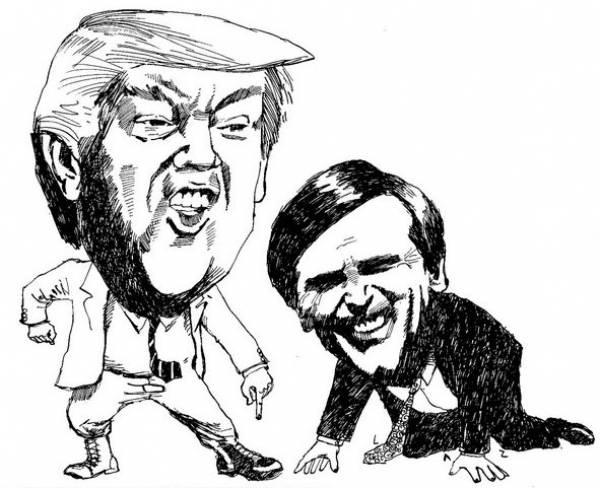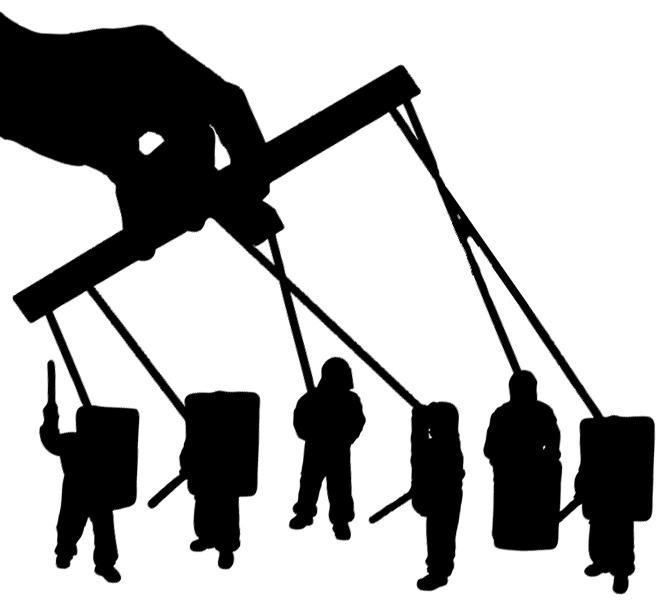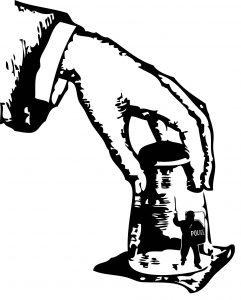
The election of the far-right candidate Jair Bolsonaro in Brazil tells us a lot about the current direction of the world, about where the different cycles of capital management and authoritarian projects are heading at a global level and more specifically in the region. The progressive governments have already fulfilled their role over the last 20 years, and what should be obvious but has been treated as paradoxical, is that one of their functions seems to have been to secure fertile ground for the rise of extreme right-wing governments.
To try to get a clear understanding of what is taking place it is necessary to travel in time and space, through different places, to examine strategies that have gradually been repeated by the State according to its needs. It is very likely that Bolsonaro’s government will usher in a new era of totalitarian governments in South America, similar to the 1964 military coup in Brazil that initiated Operation Condor. Differing from that era, the current governments are supposedly ascending within the democratic framework, and to say supposedly, is to understand that these frameworks are defined by the powerful and at the same time they violate them every time that it is convenient for them to do so. A path that has led today to the growing popularity of political figures such as José Antonio Kast in Chile and Alfredo Olmedo in Argentina, who have profiles very similar to that of Bolsonaro.

Who Is Bolsonaro?
Jair Messias Bolsonaro is a retired military man who began his political career in 1989 as a councilman in the city of Rio de Janeiro and later as a federal deputy for the State of Rio, a position he held for 27 years, being elected 7 times. As a soldier, he was trained at the Black Needles Academy, as well as serving in the Parachute Infantry Brigade, he had turbulent periods due to having been constantly involved with demands for better salaries for the military, leading him to be imprisoned more than once for short periods. In 1988 he left the army with the rank of captain.
As a politician he had not been very productive. In 27 years he only approved two projects and his area of influence had always been the city and the State of Rio de Janeiro, with barely any influence at a national level. During a political period where the dominant discourse of appealing to democracy prevailed, to the supposed diversity of thought, where the military government was viewed from a place of being overthrown on a path towards human rights, came the speeches and positions of Bolsonaro (openly defending torture and the military dictatorship, as well as making visible apologies for homophobia, racism and misogyny on repeated occasions over the years), these soon became known nationally.
Surely on a global level, what is most impressive about Bolsonaro’s rise as a political figure is the apparent speed with which his ideas and discourse gained strength. The narrative constructed by power plays alongside an incapacity of historical analysis, seeking to annul every minimum sign of any construction of a collective memory, thus setting in motion processes that seem sudden but are actually the end result of the development of an infinite number of situations and contexts.
The political and social tensions that developed in Brazil over the last 16 years, first during the PT (Workers’ Party) government and later following the dismissal of Dilma Roussef and the MDB (Brazilian Democratic Movement) were the breeding ground for fascism.
The scandalous political crisis, generated by the news of some of the corruption schemes of the Workers’ Party and its allies, especially framed within the so-called “Operation Lava Jato”, fed the popularity of the right. It is redundant to speak of politicians and businessmen stealing, however it is worth highlighting here the fundamental role of the media in the construction of this imaginary, which, motivated by political interests, bombards a sector with denunciations, thus favoring its opponents. In a country full of nostalgia for the dictatorship, it has also meant an increase in the popularity of the military, since they have always enjoyed an incorruptible image, obviously not based on facts, but on the censorship and control they have over the media.
The Iron Fist of Security…
Public security has been another of the fundamental pillars in the rise of the “new” regime, which is also said to be in crisis. Brazil has historically been a benchmark in South America for security policies, all under the banner of the war on organized crime, which manages a high level of war power and territorial control, which is publicly managed as a “parallel power structure”. There is no need to go deeper, just to point out that obviously there is not much of a parallel, being incredibly useful to the State, to its repressive policies and to the citizen imaginary that demands more police.
It is the extreme levels of misery that are one of the greatest causes of violence, and it is poverty and dissatisfaction that they want to control. The gradual militarization process of the poor neighborhoods, the favelas, has never stopped, it has only increased year after year. The city of Rio has been the spearhead in these experiments, for its political and economic importance and for the level of armed conflict between the security forces and organized crime, culminating with the decree in February 2018, ordering federal military intervention in the State of Rio by President Michel Temmer, a first under democracy.
This was a milestone for spreading the idea that a strong hand was necessary to solve the problem, which culminated with an increase in popularity for Bolsonaro and the military in general, which was expressed very strongly in the truck drivers’ strike of May 2018, an historically right-wing sector (similar to Chile), where one of their main demands was military intervention at the national level. It is worth remembering that apart from Bolsonaro, his vice-president General Hamilton Mourao and seven of his ministers are all military.
Bolsonaro’s position regarding the carrying of arms by citizens has also contributed a lot to his success, since he decided to roll back the disarmament policy that existed in Brazil, to make it easier for “good citizens” to have access to guns. Among the most striking of the various images of the circus of horrors he unleashed were the videos showing people public displaying their weapons in the streets, celebrating Bolsonaro’s victory and the “end of the party of delinquents”.

God Above All…
Religion has been another of the bastions of the rise of fascism in Brazil, the country with the most Catholics in the world and the second with the most Christians. A supposed secular country that has never effectively separated God and the State, since it is the continuity of the process of 518 years of colonization of the region. It is specifically sectors of the evangelical church and its arm in the congress, the so-called “evangelical bench”, that were indispensable for the election of Bolsonaro.
It is worth mentioning that this same political sector played an important role in fermenting the tensions that construct this context today, for example, the then president of the chamber of deputies and evangelical pastor Eduardo Cuña was the one who led the process of the dismissal of former president Dilma Roussef. It was also this sector, defending its religious morality, that tried to prevent the approval of any project related to what they call “gender ideology” and sexual diversity. Homophobia has been an important part of this picture, which has gained stronger political support than ever, it is worth remembering that along with their awards for the number of Christians that Brazil “wins the trophy” for the country with the most murders of trans people in the world.
The greatest proof of this consolidation of the relationship between the government and the evangelical church is that the one chosen for the newly created ministry of family, women and human rights was Pastor Damares Alves, who is known for public appearances vigorously defending Christian morality, vehemently condemning homosexual marriage, and the right to abortion, which exists in Brazil for victims of rape and when there is a risk of death for the mother. Among its controversial projects is the so-called “bag-rape”, which aims to grant a monthly payment to pregnant women who were raped and have decided to have their children.
In addition to this, another worrying fact about this ministry is that the FUNAI (National Indian Foundation), an organ that was previously linked to the Ministry of Justice, will be linked to this new ministry, which means that the evangelization of native peoples will be supported by the State, among other atrocities, which until now had been protected by a law that prohibited the construction of churches in Indigenous territory. Also in the curriculum of the minister is that an NGO that she owns, the ATINI, would be responsible for the abduction of Indigenous children, under the pretext of protecting them from infanticide practiced by some ethnic groups.
One of the other extraordinary aspects of Jair Bolsonaro’s popularity is the fanaticism and idolatry that many of his followers express, which is almost religious, but which also bears a profound similarity to the fascist fanaticism of previous times. The deification of Bolsanaro in Brazil today is quite similar in many ways to that of Adolf Hitler during Nazi Germany. Like Bolsonaro, both Hitler and Mussolini came to power by democratic means.
Uncle Sam’s Influence
As in the past when Operation Condor was orchestrated in a coordination between the South American governments and the United States, today the new wave of totalitarian governments do the same, using different tools but with the same enthusiasm to ensure their territorial and economic control.
Advances in technology have considerably increased the possibilities for manipulation, which means that the military coups of the past are no longer necessary. For among all the cards they have up their sleeves, there ia one that made them win the game: social media.
Steve Bannon, the former White House chief strategist in the government of Donald Trump, and also one of the heads of his campaign, played an important role in this feat. This nefarious character, a retired US Navy high-profile soldier and former investment banker along with right-wing billionaire Robert Mercer, developed a campaign method based on social media. For this they hired computer companies, that used access to social media data and algorithms to build profiles of the sectors of society most receptive to their propaganda. So-called “fake news” played an important role in this, where by means of false information they contributed to ruining the popularity of their opponents.
This helps to explain, for example, how a businessman with no political background and with little support from the media is now the president of the most powerful nation in the world. After Bannon’s departure from the White House, he has been traveling around the world using his methods to support various extreme right-wing parties and movements, among them Bolsonaro, whose campaign success was based primarily on the use of social media to spread “fake news”.
Chicago Boys
The neo-liberal doctrine applied by Pinochet in Chile is the biggest reference point at an economic level for the Bolsonaro government. The gentlemen who occupy some of the most important positions in economic management are all linked to the University of Chicago and the ideas of Milton Friedman and Arnold Harbegerger. Among them are the Minister of Finance, Paulo Guedes, who as well as his training at the University of Chicago, also held a full-time teaching position at the University of Chile during the military dictatorship. The new president of the Bank of Brazil, Rubem Novaes and the new head of the State development bank BNDES, Joaquim Levy, both share a similar background.
The unbridled reign of the free market is the keynote of this administration, where there will be no restrictions impeding the enrichment of the country. This economic projection implies a huge increase in the destruction of the territory, a real massacre, since the government will lift all restrictions against mono-cultures, livestock and the implementation of mining and power generation projects. It is also worth noting that one of the strongest supporters for the election of Bolsanaro in Congress were the so-called “ruralist bench”, a political sector that defends the interests of large landowners.
The Intensification of Repression
The increase of repressive policies can be seen with the rise of the new government, first of all it is worth highlighting what could be called citizen repression, which has intensified a lot since the first round of elections in Brazil, based above all on moral positions and the the policy of arming citizens. This is clearly visible in the waves of violence that took place right at the end of the first round and at the moment of victory, which claimed the lives of more than 10 people and where there were countless acts of aggression of various types and intensities, where the target has always been above all the so-called “minorities’, sexual dissidents, Black people and opponents of the government.
The first person to be assassinated by blind followers of the new regime was Moa do Katendé, who on the night of the first round of the elections, had an argument with a Bolsonaro voter in a bar, who went to his house and grabbed a knife and then returned to cowardly murder Moa with 12 stab wounds to his back. Moa was a well respected elder of the African community in Salvador-Bahía, a recognized leader of Capoeira Angola and creator of the afoxé bloc, “Friends of Katendé”. Moa’s death has been a milestone in the recent history of antifascist struggle, and his memory has been vindicated by various areas of struggle, including by anarchist comrades.
Within this same wave of violence emerged a factor that cannot go unnoticed, an increase in police violence and brutality protected by the policies of the new government. There have been numerous cases of police violence against opponents of Bolsonaro, including beatings, physical and psychological torture, and in most cases, carried out with clear support for the new president and the return of an explicitly militarized administration. The Brazilian police, known for their brutality and high number of killings (official figures in cities like Rio and Sao Paulo speak of 500 to 600 people killed each year) are emboldened by a president who want to give them carte blanche to kill, something he has made clear at various times and which is well illustrated by his slogan: “A police officer who does not kill is not a police officer”.
It is certain that the sectors most affected by the repression will be Indigenous peoples, Quilombolas (1), landless peasants and all those who are fighting for territory. As already mentioned, the management of this government works hand in hand with the landowners, increasing their capabilities of exercising control through force in a region bathed in the blood of the struggle for the Earth. In the midst of the “celebrations” of Bolsonaro’s victory, there were at least 3 armed attacks against landless camps and Indigenous villages and more recently, 2 MST (Movement of Landless Workers) militants were murdered by thugs at a camp, which is not a new occurrence, but a clear sign of an increase in the intensity of these attacks. Part of Bolsonaro’s project to arm the citizenry is the freeing up of weapons of war for landowners such as the use of 7.62 rifles.
Another important fact to mention regarding the policies of this government in relation to the Indigenous peoples, is its argument about ending the “isolation of the Indians” and not “treating them differently”, this idea of treating the Indians the same as any other citizen implies that they intend to halt all land-approval and demarcation processes, removing all restrictions to exploit the lands of these people, which were not just simple concessions granted by the State, they were achievements won through struggle. The groups of people who have remained uncontacted because of these restrictions, for example, could cease to exist within a few years.

The Specter of Terrorism
Beyond hypothetical and true moral differences, it must always be recognized that many fascist projects are nothing more than the continuation and strengthening of the projects of previous governments, both left and right, often progressives play with double discourse and fascism shamelessly plays with a two-faced policy, reaffirming what was hidden in the discourse of the left. These projects be they military, economic or territorial, don’t just reflect the strategy applied for the management of the State, they also reflect the interests of international Capital and power at a level that goes far beyond a single territory.
Similar to other countries, the anti-terrorist law will be one of the fundamental pillars of political repression, since its enactment enables harsh prison sentences, isolation and dispersion (2). Proposed as a strategy to combat the possibility of attacks during the World Cup (2014) and during the Olympics (2016), it was approved in March 2016, under the government of Dilma Roussef. During the same year, the federal police launched “Operation Hashtag”, arresting about 15 people for their alleged links with the Islamic State and for planning attacks during the Olympics. The following year, 8 of these people were sentenced to between 5 and 16 years under the anti-terrorist law.
What is important to note in this case, apart from the fact that this was the first effective application of the anti-terrorist law in Brazil, is that the convictions were solely based on conversations that took place on social media, which tells us a lot about how the strategy of repression can be used in a regime where expressing dissent is going to be increasingly persecuted.
Both Bolsonaro and his minister of justice, Judge Sergio Mouro, who presided over the “Lava-jato” operation, have already expressed their enthusiasm for strengthening the anti-terrorist law, included among their proposals are the classification of the occupation of land and buildings as terrorist acts and the application of harsher sanctions for financing terrorist organizations. The objective is clear, to be able to impose harsher sentences against anybody who dares to position themselves in open conflict with the current government.
Along with the anti-terrorist law, two other laws play a similar role: the national security law, which arose during the military dictatorship and is very similar to the anti-terrorist law but perhaps less updated, which in recent times was attempted to be applied against people arrested in the uprisings of 2013 and a couple of weeks ago, against a student, who was arrested for making death threats on social media against the president. Also the criminal organizations law, which has historically been used to deal with members of organized crime groups could easily be adapted and applied against political organizations.
And What About The Anarchists?
After the revolts of June 2013, there was a major intensification of anarchist activity, fanned by the flames of this month of destruction, an infinite number of constructive initiatives arose. Collectives, spaces, events, solidarity initiatives for those who suffered persecution for the events of June, explosive and incendiary attacks, the appearance of encapuchados (hooded ones) and increasingly violent protests.
Faced with the repression of the left, there was a strong interest in autonomous initiatives of struggle, which obviously had always been present, but which gained much strength during the heat of those days.
Along with this activity, the repression also advanced, in its methods and in its knowledge from being faced with an apparently new enemy. The turbulence in the streets reached its final peak during the protests against former president Michel Temer, between the end of 2015 and the start of 2017. After this, the intensity gradually died down, which can be analyzed from many subjective positions but it becomes difficult to find objective answers. What is true is that beyond these numerous explosions, indomitable cells that continue to fight domination have never ceased to exist. This does not detract from the fact that we are realists, and that the arrival of fascism caught many comrades sleeping, this precise moment that we are experiencing is one of an even more intense decline in anarchist activity, of dispersion, and also of recent repressive events (Operation Érebo in Porto Alegre and the conviction of the 23 in Rio).
It is also impossible not to mention the phenomenon that took place in the face of the imminent arrival of fascism, stunned by terror and faced with the lack of will to self-organize, many anarchists not only voted for the PT but also went so far as to campaign in their social networks as a kind of strategy to sweep away fascism.
The terror generated because a government with the level of brutality and repression like Bolsanaro’s was approaching is completely understandable, but the lack of memory is not. To forget what the repression and persecution of the left meant, not only to the anarchists, but also to various environments of struggle, to forget militarization, the Earth devastating mega-projects, the mega-events, the massive evictions in order to become a driving force of their disgusting political project. There is a lack of analysis, which is surprising, coming from people who are aware of what the electoral farce means, to believe that the rise of fascism could be resolved via an election.
Beyond that, the first great battle that comrades are facing is to survive, however, little by little, small but valuable initiatives are sprouting that are fanning the flames of anarchy in the face of such an adverse context.
There are many inspirations but there are no recipes for fighting against something that our generation has not lived through before, surely it will be the same experience that is shaping this story. There are also things that are important to mention, first of all the need to unite, to look at each other face to face and somehow overcome the disinterest and or fear of organizing to face this situation, to face the force of the enemy, to expand beyond our circles, building connections and joining forces when possible, especially in the defense of the territory and empathy for the Earth.
The memory in our hearts and the creativity in our hands will be the means to continue destroying this world and realizing our dreams.
Notes:
(1) Quimboloas is the name that the Black communities that are descendants of the Quilombos are known by. They were autonomous communities formed by Black people who rebelled against slavery, escaped, and with these small cells waged war against the slave system, rescuing other Black people, sabotaging haciendas, burning plantations, stealing weapons and murdering lords, thugs and other lackeys. The first and largest Quilombo was that of Palmares, which lasted 100 years. In Spanish-speaking countries, the Black Quilombolas were known as cimarrones.
(2) The prison system in Brazil has one of the harshest isolation regimes in South America. The RDD, a differentiated disciplinary regime, which is usually used against the heads of organize crime, means that no prisoner has spent more than 2 years under it, except for the political prisoner Mauricio Hernandez Norambuena, known as Commander Ramiro, who after 16 years, in December 2018 was finally granted a transfer to the regular prison regime. Prisoners in federal prisons are also constantly dispersed, thousands of kilometres away from their places of origin.
(via Publicacion Anarquica Madre Tierra)
Origanally posted 27/08/2019
via anarchistsworldwide.noblogs.org
